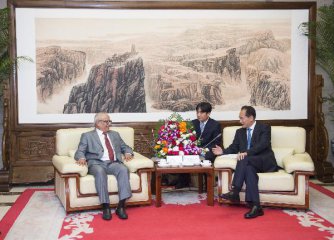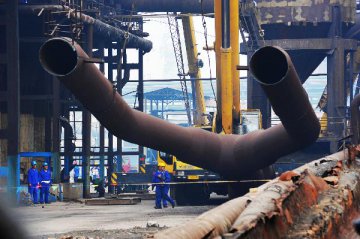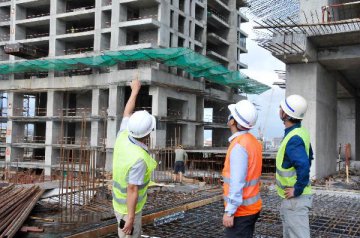
The launch of a new manned space mission brings China closer to the establishment of a permanent space station, international experts say. Chinese taikonauts, Jing Haipeng, 50, and Chen Dong, 37, were blasted off into space onboard Shenzhou-11 at 7:30 a.m. Monday (2330 GMT Sunday) and will spend 30 days in the Chinese space laboratory Tiangong-2. The launch marks a key step toward China's plan to eventually operate a permanent space station, said Russia Today television. The successful launch of the Shenzhou-11 spacecraft is another step forward to put China among leading players in space technology, said Alexander Zheleznyakov, a Russian expert on history of space flights.
China's experimental space lab will help provide solutions for spacecraft of different functions to approach and dock, and for a long-term operation of life support system, said Zheleznyakov. Shenzhou-11 is scheduled to dock on Wednesday with Tiangong-2, which is part of China's plan to build a permanent space station by 2022. Igor Lisov, a prominent Russian space expert and an editor at the industry magazine Cosmonautics News, spoke highly of China's launch of the manned space mission. China can now test technologies for cargo spacecraft docking, life support system operation and water recycling to ensure a long-term continuous operation of its space station in the future with less dependance on replenishment from the Earth, he said.
If all goes well, China will launch the unpiloted Tianzhou-1 cargo ship next spring to autonomously dock with Tiangong-2. Tianzhou-1 will be capable of automatically transferring propellants, a crucial requirement for space station assembly and maintenance, according to a report by Columbia Broadcasting System (CBS). "That will further their docking capabilities needed for the larger space station," Johnson Freese, a professor at the Naval War College and an expert on China's space program, was quoted as saying by the CBS. "Tiangong-2 is supposed to be able to stay in orbit for two years or longer, so that's taking them (Chinese) really close to 2019 or so. I think this will be their last big technology test phase before going to their large space station," said Freese.
The steady progress of China's space program has aroused criticism against the United States, who refused to cooperate with China in the International Space Station program and forced China to develop its own. While the European Space Agency and Russia are cooperating with China, NASA of the United States is currently largely prohibited from doing so by law, said the Finland-based news website gbtimes.com. With the current U.S.-led International Space Station expected to retire in 2024, China could be the only country with a permanent presence in space, said the National Broadcasting Company (NBC).
China has already signed an agreement with the United Nations opening the Chinese Space Station to receive science payload, astronauts and even modules from countries around the world, the gbtimes reported. China is "on the rise and the United States is in very real danger of falling behind in the future," Leroy Chiao, a former NASA astronaut and veteran of four space flights, was quoted by the NBC as saying. Despite being decades behind the U.S. space program, China is clearly catching up and using what Chinese experts call the "latecomer's advantage," the NBC reported.
























Latest comments